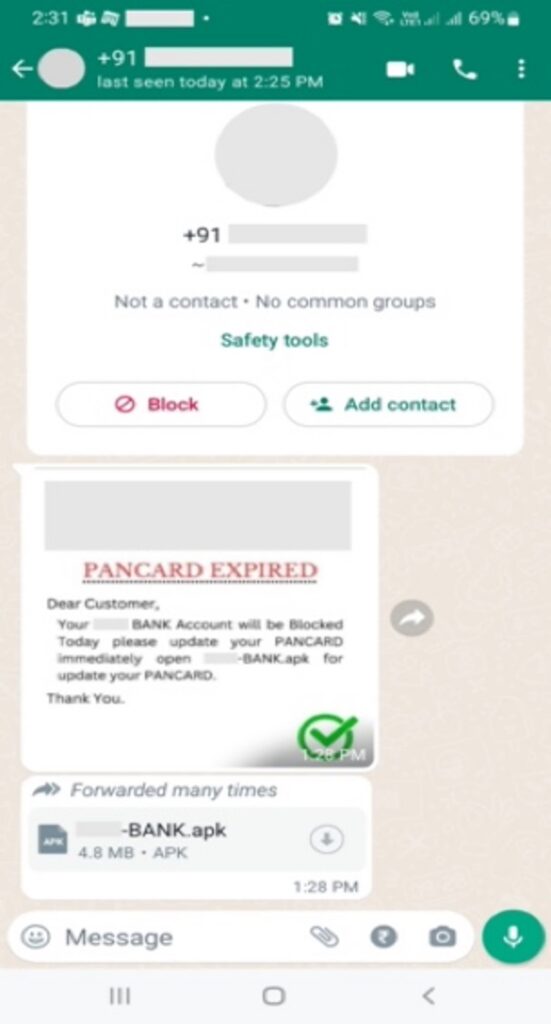NEW DELHI — An alarming surge in mobile banking trojan campaigns has put Indian users at risk, with cybercriminals leveraging popular social media platforms like WhatsApp and Telegram to launch deceptive schemes. These campaigns aim to deceive unsuspecting users into installing malicious applications masquerading as legitimate services offered by banks and government entities.
Rising Threats and Exploitative Tactics
These malevolent campaigns, as unveiled by researchers from Microsoft, have adopted more sophisticated tactics to infiltrate users’ devices. Unlike previous methods relying on malicious links, the latest strategies involve directly sharing fraudulent APK files, imitating well-known banking apps, to exploit the trust users place in these institutions.
ALSO READ: India Prepares to Deploy Trained ‘Cyber Commandos’ for Cyber Defence
The initial investigation revealed the modus operandi of these campaigns. In one instance, cybercriminals initiated a WhatsApp phishing campaign, distributing a deceptive message containing a malicious APK file posing as an official banking app. The message falsely claimed that the user’s bank account faced imminent blocking, coercing them to update their PAN card through the provided link.
Upon installation, the deceitful application stealthily harvested sensitive data, including personal information, banking credentials, and payment card details. The app’s interface closely mimicked that of legitimate banking apps, tricking victims into disclosing their mobile numbers, ATM pins, and PAN card specifics.
Subsequently, victims were coerced into believing that deleting the app would disrupt the ongoing verification process, keeping the fraudulent app running in the background, concealing its malicious activities from the user.

ALSO READ: Uniting Against Ransomware: Global Alliance Commits to Never Pay Ransom to Cybercriminals
Heightened Risks and Microsoft’s Advisory
In another instance, a parallel tactic targeted users’ payment card details, amplifying the risk of financial fraud. The malicious app, while soliciting personal data like names, email IDs, mobile numbers, and birthdates, particularly aimed to pilfer credit card specifics, posing a severe threat to users’ financial security.
To counter these treacherous attacks, Microsoft strongly advised users to solely download and install applications from authorized stores or the official websites of their respective banks. Researchers also underscored the importance of disabling the ‘Install Unknown Apps’ feature on Android devices to mitigate potential risks.
ALSO READ: Banking Security Alert: Finance Ministry Calls for Cyber Review Post UCO Bank’s Rs 820 Crore Glitch
Microsoft’s Efforts to Mitigate the Threat
In response to these malicious campaigns, Microsoft has taken proactive measures. The company is diligently notifying affected organizations while providing support to counter these fraudulent endeavors. Their efforts aim to collaborate with affected entities to curb these malevolent activities and enhance security measures for users.
As cyber threats continue to evolve, vigilance and adherence to recommended security practices become paramount to safeguarding personal information and financial assets in the ever-expanding digital landscape.
The proliferation of mobile banking trojan campaigns poses a severe threat to Indian users, necessitating heightened vigilance and proactive measures to counter these deceptive tactics. Microsoft’s uncovering of these malicious schemes underscores the urgent need for user awareness and stringent security practices to safeguard against potential cyber threats.
Amid the evolving landscape of digital fraud, collaborative efforts between tech companies, financial institutions, and users remain essential in fortifying defenses and ensuring a secure digital ecosystem for all.




